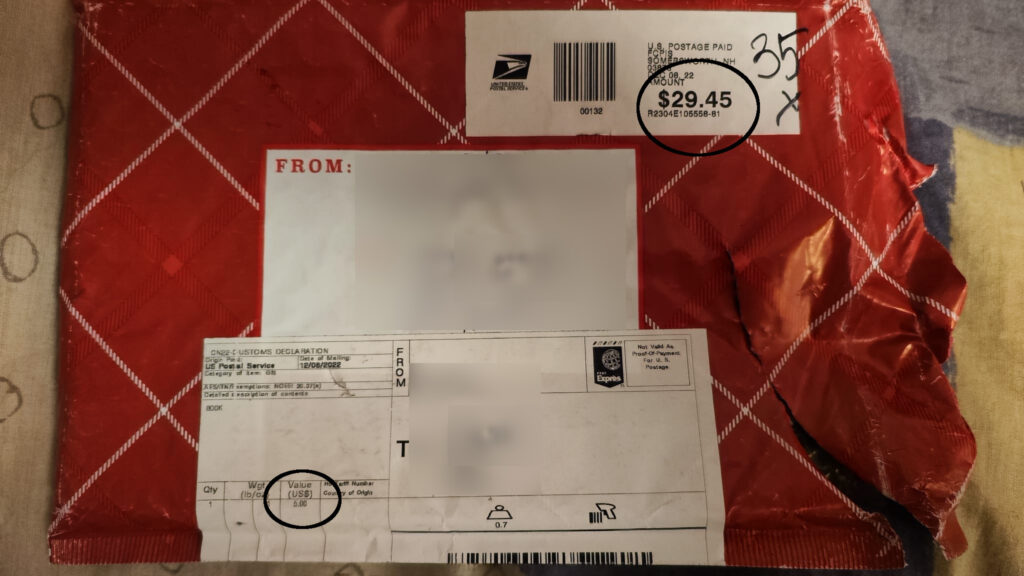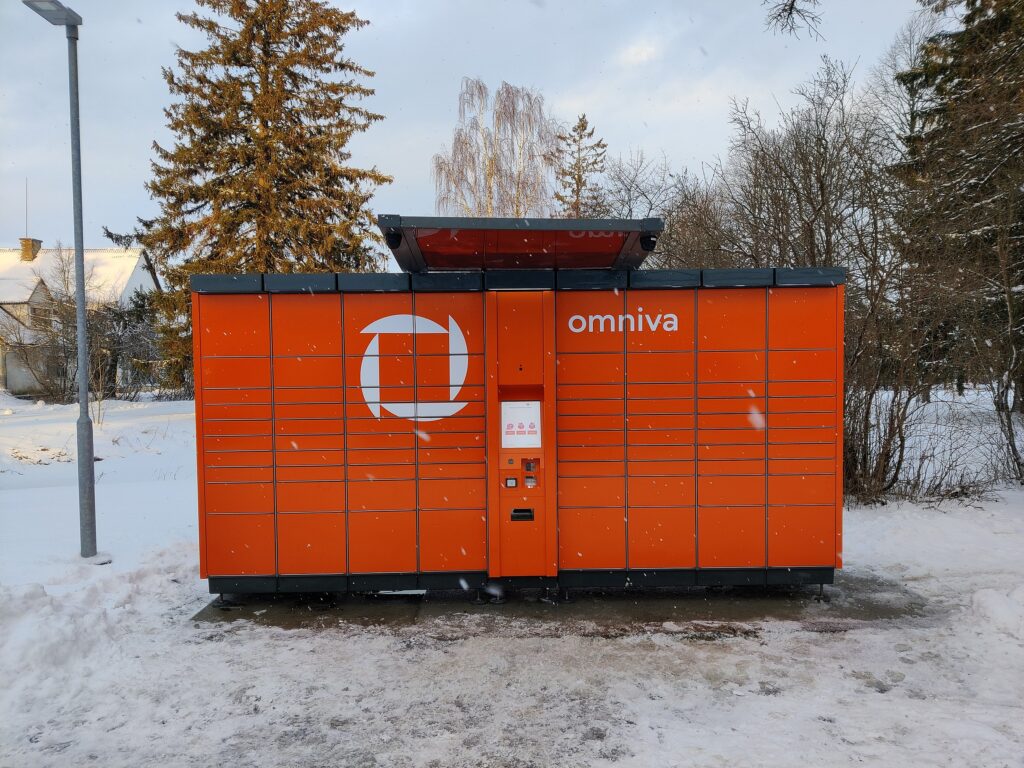The Estonian postal and customs system deliberately makes receiving parcels from outside of the EU difficult – and for no other reason than “because it is so”, Sten Hankewitz, the executive editor of Estonian World, writes.
There’s an old saying: Estonians follow Russian stupidity with German preciseness. Nowhere is that truer than when we look at how the Estonian postal and customs system deals with packages that arrive in the country from outside of the European Union.
I recently published a book and naturally wanted to send a few copies of it to my family and friends in Estonia. The trouble is, I live in the United States, and when you send a parcel to Estonia from outside of the EU, the recipients of the said parcel are treated, contrary to the normal world, “guilty until proven innocent.”
When you mail a package to an addressee outside of your country (or a bloc like the EU), you have to fill a customs declaration where you put down your parcel’s value, what it is, whatnot. I priced the parcel at USD5, the shipping cost was a little less than $30. Altogether, USD35, or €33.
The website of the Estonian postal service, Omniva, says the recipient must pay import taxes for a package that’s customs value exceeds €45. Calculate it how you will, the cost of the parcel my family and friends were to receive did not exceed €45.
The recipient must prove they’re not a camel
And yet, even though Omniva has the customs declaration, and the cost of shipping is clearly visible on the package, the recipient must prove to the Estonian Tax and Customs Board that the value of the package doesn’t exceed the set limit.
The recipient! A person who may not even know what is being sent to them as a gift. A person who has no idea how much the shipping costs may have been. What if I wanted to surprise someone with a gift? How would the recipient even know they’re receiving someone from me?
But do you know who knows what the parcel is worth? Omniva. Who knows what the shipping costs were? Omniva. Because it’s right there, on the customs declaration and on the parcel itself.
So this is how the system works (or doesn’t work). “First, Omniva sends you a letter that you need to declare the package and immediately offers that it can do it for a fee. It’s smarter to tell them to sod off because doing it yourself is easy. You log into the Estonian Tax and Customs Board website, add the value, upload the documents and it’s done,” a friend of mine says.
Easy, sure. But Omniva already knows the value of the package. Why torture the recipient?
“But this is retarded. They already know what’s the value of the package,” I tell him.
“Yeah, they [Omniva] should, it’s similar data as the sender’s name. And even if the shipping cost isn’t on the package, then it is somewhere in the system,” the friend explains. He also says that, even though Omniva should already know what’s in the package – because it’s written in the customs declaration – the recipient is the one who has to know it and enter it into the customs board website.

It’s a gift. Get it?
But what if it’s a surprise? What if the recipient doesn’t know what they’re receiving?
And, once again, the value of the item in the parcel is clear from the customs declaration. The shipping cost is clear from the package. What is Omniva’s problem?
Another friend sent me screenshots of him filling in the customs declaration. They showed fields of the shipping fees and document upload options, and also, one of the checkboxes addressed paying the VAT while buying the goods they were about to receive. Even though, it was clearly marked on the customs declaration that it was a gift.
Also, the declaration system demands that the recipient – before receiving the gift I sent them – know my address. I mean, what? Why? Omniva already knows my address, it’s written on the package!
I sent both Omniva and the Estonian Tax and Customs Board a bunch of questions about this inanity that surrounds receiving packages from outside of the EU. My main question was, why couldn’t they just release a package from the customs immediately when it arrives if it’s clear that the parcel’s value didn’t exceed €45. I specifically asked whether excessive inconveniencing of people is really something the Republic of Estonia should be engaged in.
I mean, how is it even possible that the recipient must prove the value of a parcel they haven’t yet received? And why do I need to send the recipients a photo of the shipping receipt so that they could upload it into the customs board website, if they already have all that data in the first place?
A PR specialist at the Estonian Tax and Customs Board came back with an outrageously generic email that felt like a standard copy-paste reply.
“The obligation to declare all packages coming from outside of the European Union – both purchases from an internet outlet or gifts from private parties, despite of their value – comes from a European Union VAT directive that Estonia as a member state has adopted,” she said.
“We understand that people who don’t deal with it every day and don’t receive parcels from third countries, this may seem like an unpleasant chore. But we’ve tried to find solutions, together with the postal services (like Omniva), to make it more user friendly.”
“The most convenient way to declare parcels electronically is in the e-service environment e-MTA (the online environment of the customs board – editor) that is very familiar to all the people in Estonia – they declare their annual taxes there and they’re very happy with it.”

Pay extra for a postal service to do its job
“When a person doesn’t want to try that, then for an additional fee, they can have the postal or the delivery service or another customs agency to fill the customs declaration. If that’s the case, one needs to pay the customs declaration fee and pay the taxes for the parcel before receiving the package.”
This is the most Estonian explanation of anything I’ve ever seen. Basically, the things are the way they are because that’s the way things are. It is what it is, to quote the classics.
In general, if one wanted to receive a parcel from outside of the EU and didn’t want to deal with all that bureaucratic bullshit, one would have to PAY extra money to Omniva (or another parcel service) to actually LOOK AT THE PACKAGE. Bear in mind, all the data the recipient must declare are already ON THE PARCEL. But if you don’t want to deal with this bureaucratic nonsense, then it takes an extra fee for Omniva to do its bloody job.
A country literally blackmailing its citizens into paying it extra fees for something that should be elementary and done automatically – no, hell no. A government exists for the people, not vice versa.
I sent a follow-up email to the Estonian Tax and Customs Board and specifically asked, why is the Estonian state making its citizens’ life as difficult as possible, if it could be much easier. Again, I asked, why does a recipient of a parcel need to prove how much a parcel is worth if the postal service already clearly knows it.
That was on 29 December. Today is 7 January, and I have yet not received a reply.
I’m used to receiving all packages on my doorstep from wherever they come. Without me doing absolutely anything.
But Estonia treats people who receive anything outside of the European Union as potential offenders who must crawl out of their skin to prove they had done nothing wrong.
Just because someone sent them a gift. A gift.
The opinions in this article are those of the author.


Предлоги могут быть разными, мол, борьба с наркотой, с русскими, которые за войну, и т.д. НО ПРАВО ЧАСТНУЮ ПОЧТОВУЮ СВЯЗЬ явно нарушено, чем объяснить пока неясно…
This is Europe wide. It’s not just Estonia.
I have a daughter living in Ireland. A friend sent her some powdered salad dressing from the USA as a gift. She had to pay something like 20€ import tax, before the small packet was delivered.
I too have exactly the same issue here in Portugal (as do many) Portuguese customs stops and holds everything for ransom. If you don’t pay the item is returned to sender. But of course it isn’t. Where it goes, nobody knows?
Sorry Sten, but this is a EUropean thing. Estonia is just following the trend.